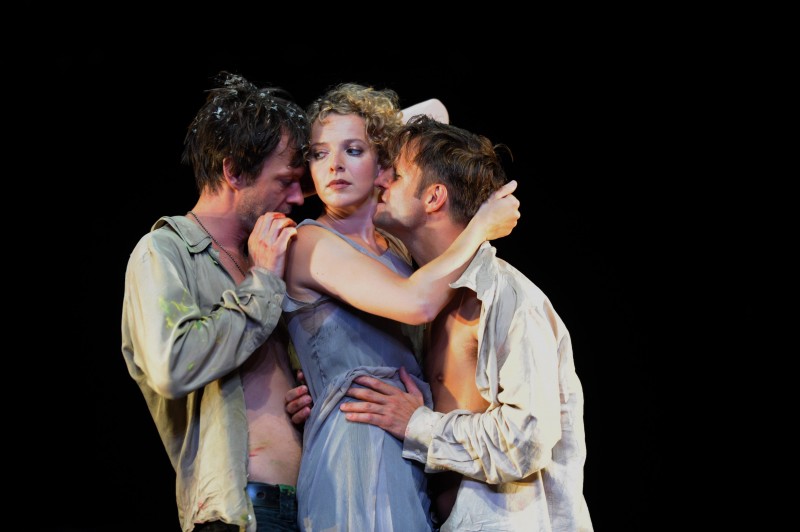Director Nicolas Stemann appeared on stage with a microphone at the start of nearly every section of his Faust I+II to explain the plot of Goethe’s two-part tragedy bit by bit as the performance unravelled. “Unravelled” feels like an accurate description of the evening, but – like Stemann – I should preface my statement with a fast-forward through the storyline:
Faust I: Faust is bored of academia. He wants infinite knowledge, and makes a pact with the devil, Mephisto: Mephisto will do whatever Faust wants on earth, the catch being Faust will have to serve Mephisto in hell. Faust claps eyes on Gretchen, the most beautiful girl in the village, and sets Mephisto to work on getting her for him. Job done, they fall in love, and then Faust proceeds to ruin Gretchen’s life. She kills her mother with a sleeping potion, he kills her brother, she drowns their baby.
Faust II: Mephisto invents paper money. Faust decides the most beautiful girl in the village wasn’t enough, the most beautiful woman in the history of the world, Helen of Troy, would be much better. Faust faints. Mephisto revives him by bringing him to a professor who has created the personification of art. The personification of art leads them to Helen. Helen and Faust live together and have a child, Euphorion, who is unsatisfied with life and dies. Helen dies of unhappiness. Faust tries to conquer the world, or at least a lot of land. He gets some. Faust dies, and his soul belongs to the devil.

Faust I + II: Sebastian Rudolph, Patrycia Ziolkowska, Philipp Hochmair. Foto: Krafft Angerer.
So now when I tell you that the first part of Stemann’s production was for the most part a strong, coherent piece, while the second part was for the most part a completely baffling unravelling of the Faust tragedy – well, what’s a guy to do? Goethe could definitely rhyme, but when it came to stageable theatre tackling the big questions of man’s existence, the man himself wasn’t convinced of his own abilities.
During the interval following the first two acts of Faust II I heard several people saying that Faust I was the reason the production had been invited to the Theatertreffen. Of course we won’t know if this was the case until all the jury members have retired (even then they’d probably still be sworn to secrecy), but there’s plenty of reasons to believe it. The three main actors, Philipp Hochmair, Sebastian Rudolph and Patrycia Ziolkowska were unstoppable, performing whole conversations alone on stage, morphing with a strain of the voice into a different character without so much as a costume change. Mephisto might have looked like a rockstar from the seventies as he celebrated his pact with Faust, sealed with a passionate kiss, but the avid Goethe fans in the auditorium were still happy.
Which is more than can be said for Faust II, during which many of said fans made their dissatisfaction very clear, presumably at points when they felt their hero would be turning in his grave. It’s hard to pin down what exactly triggered this; it could have been anything from the Styrofoam puppets claiming to be professors sharing anecdotes about Goethe’s private life, the line-dancing chorus of men in overalls, the opera singer who never wore the same gown for longer than ten minutes, the mixture of every feasible theatrical style, or the endless self-referential announcement that we were watching “Faust II: Uncut.” Probably it was when all of the above came together in a confusing, fragmentary mess on the stage, albeit still with excellent acting, this time with hyper-charismatic contributions from Franz Rogowski and Birte Schnöik.
I can completely understand hating this – I’m actually a bit surprised that I didn’t hate it myself. Maybe I’m still reeling from Borkman. But there is a big difference between this and the Ibsen-insanity at the Prater, which is that Stemann’s unravelling production really does reflect the unravelling of the text. He takes the risk and runs with it – and makes us all run along with him.